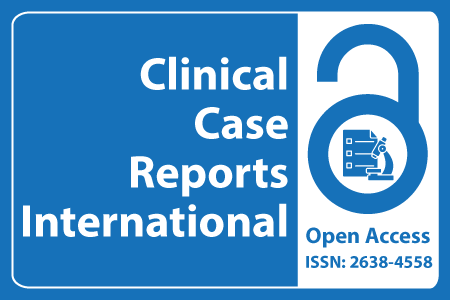
Journal Basic Info
- Impact Factor: 0.285**
- H-Index: 6
- ISSN: 2638-4558
- DOI: 10.25107/2638-4558
Major Scope
- Cardiac Surgery
- Forensic and Legal Medicine
- Surgical
- Molecular Biology
- Internal Medicine
- Preventive Medicine
- Gastric Cancer
- Hepatitis
Abstract
Citation: Clin Case Rep Int. 2024;8(1):1684.DOI: 10.25107/2638-4558.1684
Warfarin versus Direct Oral Anticoagulants in Patients with Artificial Heart Valves-A Systematic Review & Meta- Analysis
Srivastava Y, Deo SV, Almader-Douglas D and Sharma UM
Brown University, USA
Department of Surgery, Case Western Reserve University School of Medicine, USA
Surgical Services, Louis Stokes Cleveland VA Medical Center, USA
Mayo Clinic Phoenix Campus, Phoenix, Arizona, USA
Hospital Internal Medicine, Mayo Clinic Phoenix Campus, Phoenix, Arizona, USA
*Correspondance to: Umesh Sharma
PDF Full Text Research Article | Open Access
Abstract:
Background and Purpose: Anti-thrombotic efficacy of Direct Oral Anticoagulants (DOAC) after Mechanical (MHV) and Tissue (THV) valve replacement is unclear. Methods: We systematically reviewed English language publications (randomized trials and observational studies; Inception- May 2022) that compared the clinical outcome of adults (>18 years) that received Warfarin or DOAC an anti-thrombotic therapy after MHV or THV replacement for bleeding and stroke. Results: Eight studies (n=183167, 38% female; mean study duration 37.5 months) met inclusion criteria. Mechanical and tissue (bioprosthetic) heart valves (MHV and THV) were represented in 14.7% and 85.3% of patients respectively. Overall, warfarin led to 22% more major bleeding (OR=1.22, 95% CI= [1.05, 1.41], p=0.01) and 72% more ischemic stroke (OR=1.72, 95% CI= [1.1, 2.68], p=0.02) compared to DOACs. Bleeding, all-cause mortality, TIA, systemic embolism, and stroke rates were comparable between study groups. Among patients with THV, warfarin led to 33% more major bleeding than DOACs (OR=1.33, 95% CI= [1.06, 1.66]); however, among MHV patients, strokes rates were much higher in the DOAC treated cohort. Conclusion: Overall, in patients with AHV, warfarin led to more major bleeding and ischemic stroke than DOACs; the overall risks were similar in all bleeding, all-cause mortality, systemic embolism, TIA, and all-strokes. DOACs reduced the risk of ischemic stroke and major bleeding in patients with BPHV, but not MHV. DOAC risk for all-stroke and major bleeding was higher than warfarin in MHV patients.
Keywords:
DOAC; Warfarin; Artificial heart valves; Mechanical; Tissue; Meta-analysis
Cite the Article:
Srivastava Y, Deo SV, Almader-Douglas D, Sharma UM. Warfarin versus Direct Oral Anticoagulants in Patients with Artificial Heart Valves-A Systematic Review & Meta-Analysis. Clin Case Rep Int. 2024; 8: 1684.













